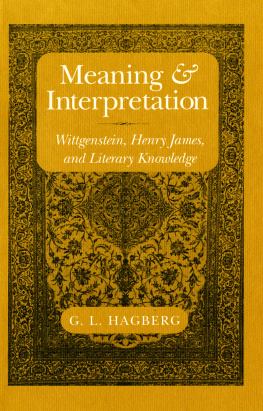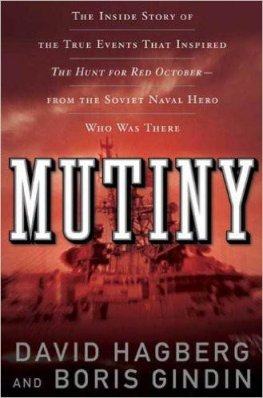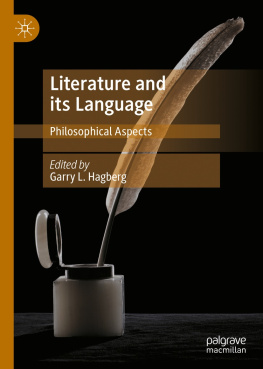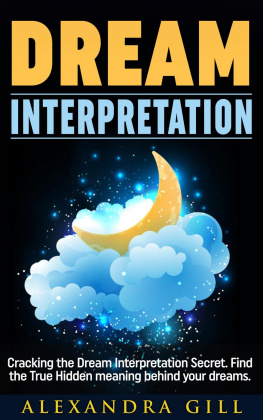G. L. Hagberg - Meaning & Interpretation
Here you can read online G. L. Hagberg - Meaning & Interpretation full text of the book (entire story) in english for free. Download pdf and epub, get meaning, cover and reviews about this ebook. year: 2018, publisher: Cornell University Press, genre: Children. Description of the work, (preface) as well as reviews are available. Best literature library LitArk.com created for fans of good reading and offers a wide selection of genres:
Romance novel
Science fiction
Adventure
Detective
Science
History
Home and family
Prose
Art
Politics
Computer
Non-fiction
Religion
Business
Children
Humor
Choose a favorite category and find really read worthwhile books. Enjoy immersion in the world of imagination, feel the emotions of the characters or learn something new for yourself, make an fascinating discovery.
- Book:Meaning & Interpretation
- Author:
- Publisher:Cornell University Press
- Genre:
- Year:2018
- Rating:5 / 5
- Favourites:Add to favourites
- Your mark:
- 100
- 1
- 2
- 3
- 4
- 5
Meaning & Interpretation: summary, description and annotation
We offer to read an annotation, description, summary or preface (depends on what the author of the book "Meaning & Interpretation" wrote himself). If you haven't found the necessary information about the book — write in the comments, we will try to find it.
Meaning & Interpretation — read online for free the complete book (whole text) full work
Below is the text of the book, divided by pages. System saving the place of the last page read, allows you to conveniently read the book "Meaning & Interpretation" online for free, without having to search again every time where you left off. Put a bookmark, and you can go to the page where you finished reading at any time.
Font size:
Interval:
Bookmark:

To the memory of my father
I initially drafted much of what follows at Cambridge University, where I presented parts of the work in progress to various seminars and meetings. I thank everyone with whom I discussed this project as it developed, especially John MacKinnon, Hugh Mellor, Alex Neill, Robert Stern, and George Watson. I also thank Colin Lyas and Michael Tanner, whose detailed commentary on an earlier draft sharpened the focus of the entire project. Most of all, I thank Renford Bambrough, who allowed me to present sections of this book to his seminars and read and commented extensively on each part as it developed as well as on the entire manuscript. I cannot overstate the philosophical benefit I derived from those many meetings and conversations, and the careful reader will see throughout the extent to which my work refers to his.
I also thank a great many people and institutions on this side of the Atlantic, including, at the Pennsylvania State University at Harrisburg, William Mahar, head of the Humanities Division, and Howard Sachs, dean for Research and Graduate Studies (both of whom put many resources at my disposal); the Research Initiation Grant Program and the Institute for the Arts and Humanistic Studies, both of which supported the work with fellowships; and a few individuals who stand out from a larger, very supportive crowd: Donald Wolff, Troy Thomas, and, most particularly, Louise Hoffman. I presented sections of the work in progress to meetings of the American Society for Aesthetics and to the International Association for Philosophy and Literature, and I am also grateful for the support and fully comprehending commentary of Laurent Stern, Lydia Goehr, and Henry Alexander, whom I thank especially for his enduring encouragement. From Richard Eldridge I received not only one but two extremely astute, constructive, and very finely detailed readings of earlier versions, both of which proved enormously helpful. I thank as well the National Endowment for the Humanities for supporting my work in Cambridge and my participation in the Institute for Theory and Interpretation in the Visual Arts at Hobart and William Smith Colleges in 1987. Of the many people to whom I am indebted from that utopian experience I must particularly mention Michael Podro and Annabel Wharton for sustained conversation on a range of aesthetic issues. Also, my good friends Allen Cox, Edward Wight, and the late Howard Roberts helped with many conversations in their areas of expertise (painting, musicology, and music performance respectively). I also acknowledge my debt to Bard College not only for providing a superb context for aesthetic scholarship but also for supporting further work in Cambridge with an Asher B. Edelman fellowship, and my debt to my colleagues in philosophy, William Griffith and Daniel Berthold-Bond, whose philosophical engagement I have found consistently inspiring.
Chapter 5 was previously published in slightly different form in Philosophy and Literature 13 (April 1989): 7595, edited by Denis Dutton; I thank the Johns Hopkins University Press for permission to incorporate it here and the editor for publishing the piece initially. The remainder of the work is published here for the first time. Last, I am indebted to Roger Haydon of Cornell University Press, who has given this project much in addition to the patient encouragement it needed, and to Andrew Lewis, whose very fine copy-editing proved extremely helpful at the final stages.
All of the above-mentioned people have made this a better work than it would have been without them (although it does not follow from this fact that any of them would agree with what Ive written); indeed, given the quantity and quality of the support this work has enjoyed, it is very much more than a pro forma move in a narrowly circumscribed language-game to say that with regard to any remaining flaws, I am entirely on my own. Carol Brener, Kathleen Elliot, Ren Horley, Kathleen Jacob, Marie Ratchford, and Janice Russ very kindly and patiently prepared the manuscripts, and to them I remain extremely grateful.
G ARRY H AGBERG
Annandale-on-Hudson, New York
Given the importance of the concept of meaning to discussions of the arts and literature, and given the importance of the philosophy of Ludwig Wittgenstein to our understanding of that concept, it seems somewhat curious that scholars in aesthetics and literary theory have made no more use of Wittgensteins potentially illuminating work than they have. In this book I attempt to do exactly that, in the hope of shedding some light on the relations between linguistic and artistic meaning, between understanding persons and understanding works of art, and between literary interpretation and philosophical analysis. I hope to achieve results more affirmative or positive in nature than those usually associated with philosophy and criticism of a broadly Wittgensteinian sort. Indeed, the Wittgen-steinian tradition has often been construed as little more than a project of confusion-removal, which closes and narrows rather than opens and expands explanatory directions and possibilities. I have much more to say about the more affirmative and illuminating aspects of the Wittgensteinian tradition, and about the dubiousness of the distinction between constructive and critical methodological categories. At present, however, a few words are in order about how Wittgensteins work has been received by those working within the disciplinary boundaries of aesthetics and literary criticism.
Wittgensteins idea of family resemblance, as a contribution to the problem of universals, has been applied to the problem of definition in the arts, and this application has profoundly changed the expectations within aesthetics of how discussions of definition in the arts could proceed.make dear in this book, I believe the story to be vastly more complicated, and very much more philosophically and critically illuminating, than such a truncated narrative of philosophical progress would suggest.
The story that follows resists encapsulation, but I can say at least that, first, it does not seem to me true that the two areas of impact just mentioned in fact capture what is of greatest significance in Wittgensteins philosophy for aesthetics and, second, it accordingly does not seem to be at all obvious that post-Wittgensteinian aesthetic theory is wiser in the way it should be if it wants to proceed as it does. So, although I do raise the issues of definition and aspect perception in this book, central to it are, rather, Wittgensteins investigations into the nature, or natures, of meaning, especially where those investigations bear directly on our understanding of artistic and literary meaning. Thus I discuss the extent and the limitthinking about these topics in the very formulation of those problems. What, however, can be said of an introductory nature from a somewhat lower altitude?
Throughout aesthetics and literary criticism the use of emotive-descriptive terms and the conjoined philosophical problem of justifying such usage (where the fully articulated description of a work is often tantamount to a fully articulated interpretation of that work) have been undeniably central. Stated in terms that are familiar (but which are in fact, as we shall see, too philosophically stark to accommodate the facts of aesthetic practice), critical engagement with a work of art or literature generates descriptions that in turn demand justification; those then-justified descriptions, collected together, constitute an interpretation that should then (if we find the justification acceptable) shape our subsequent aesthetic experience.
Next pageFont size:
Interval:
Bookmark:
Similar books «Meaning & Interpretation»
Look at similar books to Meaning & Interpretation. We have selected literature similar in name and meaning in the hope of providing readers with more options to find new, interesting, not yet read works.
Discussion, reviews of the book Meaning & Interpretation and just readers' own opinions. Leave your comments, write what you think about the work, its meaning or the main characters. Specify what exactly you liked and what you didn't like, and why you think so.







